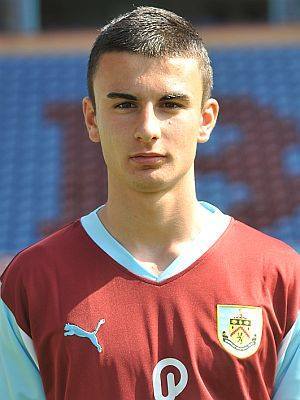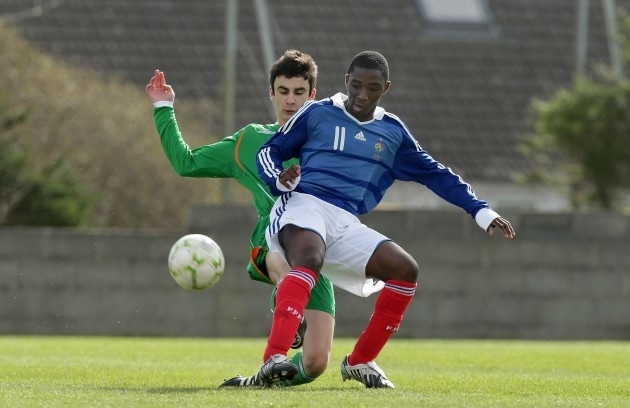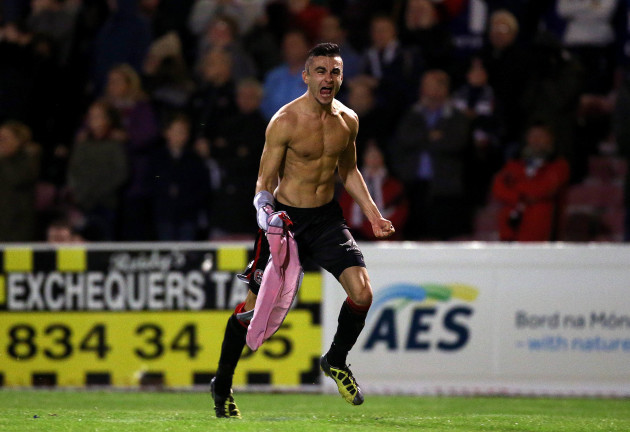A DUBLIN CITY centre cafe is not where Neil Yadolahi wants to be on a Thursday afternoon in September.
When he signed a four-year contract with Premier League club Burnley as a 16-year-old, this isn’t the situation he intended to be in by the age of 25.
But football has a knack of making its own plans for those who rely on it to earn their living. While friends and former team-mates are fighting for places and points and salaries across the Irish Sea, Yadolahi is pondering an uncertain future.
He’s reluctant to lament his lack of luck as a professional footballer, even if he could be forgiven for doing so. These are the cards he’s been dealt. Making the best of them is his only option now.
“I really don’t like blaming bad luck or misfortune or anything like that,” he says. “That’s a way of thinking you’d prefer to avoid.
I won’t make excuses for my situation. I take ownership of where I am.
Fulfilling the potential he showed at Burnley has been made impossible for Yadolahi by a series of frustrating injuries. He has travelled the world in search of opportunities to make a fresh start, yet circumstances have also conspired against the Stillorgan native.
An issue regarding unpaid wages brought a premature conclusion to a spell at Turkish club Bucaspor.
He didn’t make a single appearance for FC Banants in Armenia due to being unable to receive international clearance.
Injury struck again when he headed to Canada to play for Vancouver Whitecaps.
A deal was agreed with Persepolis in Iran but the move couldn’t be completed as the club was placed under a Fifa transfer ban.
The last few years have certainly put Yadolahi to the test, but his journey in the professional game got off to a promising start when Burnley signed him from St Kevin’s Boys during the 2009-10 season.
He made good progress at Turf Moor, where ex-Ireland international Owen Coyle was in charge. At 16, Yadolahi was a starting centre-back for the Clarets’ reserve side. Locking horns with the likes of Roque Santa Cruz and Aiyegbeni Yakubu provided him with a crash course in men’s football and he handled it with aplomb.
Liverpool, who he scored against in his debut for Burnley reserves, made their interest known. However, Yadolahi opted to stay put. After Burnley had failed to secure their Premier League status, a first-team breakthrough appeared to be within touching distance.
“I was travelling with the first-team, I got a squad number — 35 — and I was moved up to a professional contract quite quickly,” he recalls. “I felt like I was nearly there, especially when Burnley were relegated to the Championship because that obviously increased my chances of getting into the team.”
The future initially looked bright, but things began to unravel when he first encountered injury. A grade-three quadricep tear kept him out for four months. A fortnight after he returned to action, a groin problem sent him back to the treatment table.
While Yadolahi devoted himself to returning to his physical peak, tackling the mental challenges proved to be a more complicated process.
I can see now that I hadn’t been in a good place mentally since I went over to Burnley.
“It probably would have started with homesickness. I should have been going out with the boys to the cinema, bowling or whatever. But I used to stay in my room, talking to my mates back home on Skype and Facebook.
“That really hindered me in trying to settle in. It probably took me the best part of two years before I felt in any way settled there. But it was never easy. Far from it. I think it’s something every Irish teenager over there struggles with, some more than others.
“When I got injured, it was the first time I was aware of how much I was struggling mentally. It was my first injury so I didn’t know what to expect. When you’re injured, you’re in before everyone in the morning and you’re the last to leave. The days are longer and you’re going through them on your own. It’s a lonely existence.
You can get so low that you start to question whether it’s all worth it.
“I thought I was ready to play in the first team, and I made the bench a few times for cup games. But between the injuries and the changes of managers — I was at the club for three-and-a-half years and there were four different managers — it was very stop-start.
“With the way things played out, it became really difficult to move forward. You’re always starting from scratch under a new manager, especially as a young player who’s on the treatment table when a new manager arrives.”
By the summer of 2013, Yadolahi had the option of an additional season at Burnley but instead decided to accept the offer of a one-year contract from Nigel Clough at Derby County. After playing in pre-season, he suffered a recurrence of the quad injury just a couple of months into his time with the Championship club.
“That point was the lowest I’ve ever been mentally,” says the former Republic of Ireland underage international, who was born to an Irish mother and an Iraqi father.
“I eventually asked Derby to let me go home and do my rehabilitation back in Dublin. Having just joined a new club, I didn’t know any of the boys. The physio became my best friend. I was living in a hotel as well. It was a really tough time. Thankfully they let me go home on compassionate leave.
“When I got home, it became clear that I was a lot more stressed than I realised. I suffer from alopecia so I started losing my hair, getting bald patches. It was better for me to be back home but I started to think I was after letting my whole family down. I hadn’t a clue how to cope.
“You feel like you’re letting your friends at home down too. They’re all keeping an eye on how you’re getting on over in England, hoping that you’re moving forward, and when you’re injured they’re constantly asking when you’ll be back.
“But there was no one I wanted to do it for more than my dad. He put a lot into me when I was a kid, shipping me off to training all the time and making sure I never missed a session. He’d ring me nearly every day to see how I was getting on, and it got to the stage where I started avoiding the calls because I felt like I was letting him down.
“He came through a very hard upbringing in Iraq. He was 24 when he came to this country with nothing, but he’s an inspiration for me because he made something of himself. I wanted to succeed for him more than anything. When it wasn’t happening, it really got to me in a way that I couldn’t handle. It crushed me.
“I just broke down, physically and mentally. It got so bad that I’d be lying if I said I didn’t contemplate taking my own life. My doctor diagnosed me with depression, which was a tough thing to be told at that age.
Initially I thought I was wasting my time with counsellors.
“My opinion was that a stranger can’t do anything to help me. But obviously there’s a bigger picture than that. Speaking to somebody is your only choice if you want to be helped.”
After being released by Derby, Yadolahi made the ill-fated move to Turkey. It was the beginning of a world tour geared towards kickstarting his career, but ironically two of his most enjoyable spells occurred while playing at home.
When things turned sour in Turkey, he signed a short-term deal with Bohemians and helped them to avoid relegation at the end of the 2013 season. His 92nd-minute equaliser against Dundalk also effectively ended the Lilywhites’ hopes of pipping St Patrick’s Athletic to the Premier Division title.
He then left Bohs for Armenia but was back in the League of Ireland for the 2015 campaign when he joined Drogheda United. He swapped United Park for the MLS that summer but the latest recurrence of the quad injury prevented him from making an impact at Vancouver Whitecaps.
In recent years, Yadolahi has accepted senior call-ups for training camps with both Iraq and Iran (who he qualifies to represent via his grandparents), which paved the way for an opportunity to resurrect his career at Persepolis in January.
However, his prospects there were quickly dashed when a transfer embargo was placed on Iran’s most successful club for signing a player who was already contracted to a side in Turkey.
He was kept busy over the summer by rehabilitating a knee injury sustained while playing in a charity game in Gillingham in May. He’s approaching full fitness again, however, and in spite of the frequent setbacks, he’s not ready to give up on his career just yet.
“I still feel that I have plenty to offer in football,” he says. “There has been contact from a few clubs in England and one club in Ireland who’ll be playing European football next season. So we’ll see what develops with the possibilities over the next while.
“I’m only 25 and I’ve already missed a lot of football. I don’t have much to show for the last few years and I can’t get that time back. I’ve made some bad decisions which I take full responsibility for.
There were certain moves I shouldn’t have made and I should have listened a bit more to certain people. I was young, I had a bit of money and I thought I had the world at my feet.
“I’ve spoken before about my own situation with mental health and I know that managers have been put off by that in terms of possibly signing me. They see you as weak. But the bigger picture is that the more people who speak about the topic, the more likely it is that it’ll help others.
“It’s a thin line for me at this stage so the next move has to be right. Wherever it is, I just need it to be a move that makes me happy. Hopefully the injuries are behind me because I can’t wait to get back on the pitch. But as much as anything at this stage, I’d like for young players going over to England now just to be aware of stories like mine, because there are plenty of them.
“It’s important that they and their parents know the risks and the realities involved, and that it’s not always going to be easy. If a young player comes to me in a few years and says they’ve been helped by my story, that’ll mean the world to me.”
* * *
If you need to talk, contact:
- Pieta House 1800 247 247 or email mary@pieta.ie (suicide, self-harm)
- Samaritans 116 123 or email jo@samaritans.org
- Aware 1800 80 48 48 (depression, anxiety)
- Teen-Line Ireland 1800 833 634 (for ages 13 to 19)
- Childline 1800 66 66 66 (for under 18s)
The42 is on Instagram! Tap the button below on your phone to follow us!



